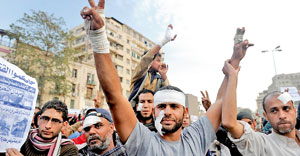UNITED NATIONS, (IPS) - The U.N. Security Council, which is empowered to intervene in crisis situations threatening international peace and security, has remained tight-lipped over the weeklong rioting, killings and mass demonstrations in Egypt - even as the political upheaval has spilled over into Jordan and Yemen.
At the same time, regional and political organisations in which Egypt is a longstanding member -- including the African Union (AU), the Non-Aligned Movement (NAM) and Organisation of the Islamic Conference (OIC) -- have refused to condemn the violence against peaceful demonstrators or even express their opinions publicly.
 |
| Wounded Egyptian anti-government demonstrators protest at Cairo's Tahrir Square on Friday. AFP |
"Egypt is not at all keen to internationalise the issue," said one UN diplomat expressing the political mood at the United Nations. "They are trying to project a picture of normalcy," he added, pointing out that Egypt is also the current chair of the 118-member NAM, the largest single political coalition in the world body.
So it is very unlikely, he said, that any of these organisations will be willing to sit in judgment over the crisis in Egypt, fearing it would amount to interfering in the domestic affairs of a member state.
Secretary-General Ban Ki-moon, who is known to take the lead from the United States in crisis situations, pretty much parroted the words of President Barack Obama when he called for a well-ordered, peaceful transition.
"I have stated my position this morning that the transition should begin now," he said - perhaps with the emphasis on "now", as did Obama.
After a phone call to Egyptian President Hosni Mubarak Monday, Obama said he recognises that the status quo is not sustainable and a change must take place. He said the transition from nearly three decades of repressive rule must not only be meaningful and peaceful but "it must begin now".
"Begin now?" said one journalist, mockingly repeating Ban's statement. "Perhaps the secretary-general's speech writers should be advised at least to invest in a thesaurus."
Asked about the possibility of UN involvement, including perhaps the appointment of a special envoy to monitor the developments on the ground, UN spokesman Farhan Haq told reporters on Thursday that the secretary-general had been very forceful in his comments.
But the crisis in Egypt, he said, "cannot be characterised as a threat to international peace and security" -- warranting the direct involvement of either the secretary- general or even the Security Council.
The 53-member AU, which has intervened in several political upheavals in countries such as Cote d'Ivoire, Burundi, Togo, Mauritania, Comoros and Somalia, has so far remained a bystander.
Rev. Gabriel Odima, president of the Africa Center for Peace & Democracy, told IPS the current events in Egypt illustrate how and why tyranny, and not democracy and human rights, is the leading form of governance in Africa.
The AU will not take a stand on the Egyptian crisis for obvious reasons, he stressed. "The AU is a club of undemocratic leaders who have continued to suppress and kill their citizens with impunity," said Odima.
Some of those leaders have come to power through the gun and continue to use the gun to suppress people, he added.
On the eve of founding of the AU in May 1963, the elected president of Togo was assassinated, he noted. But a condemnation of the military coup in Togo was expressed only in the corridors of the hotel rooms and not in the conference hall, nor was a resolution of condemnation moved and debated.
Just like 1963, Odima said, African heads of states who met in the Ethiopian capital last weekend discussed the Egyptian crisis only in the corridors of their hotel rooms and not in the conference hall.
"Nor was there a resolution, calling for President Mubarak to step aside, moved and debated," he said.
Suppression of dignity and personal freedoms are not confined to Egypt, Tunisia, Uganda, Zimbabwe and Cote D'Ivoire. "The majority of African states have been and are ruled by dictators," Odima added.
Odima said there is a strong possibility that mass demonstrations that started in Tunisia and later in Egypt, could spread to countries like Uganda, Zimbabwe, Algeria, Eritrea, Ethiopia, Rwanda, Democratic Republic of Congo, Cote D' Ivoire, Kenya, Angola and other African countries. |


